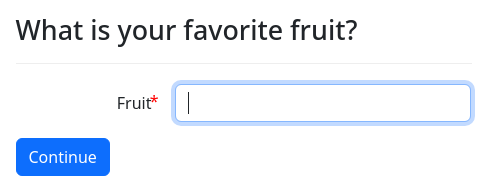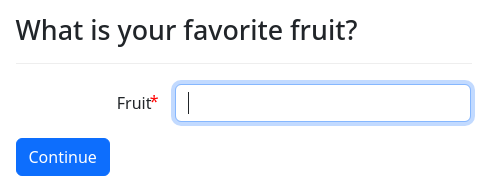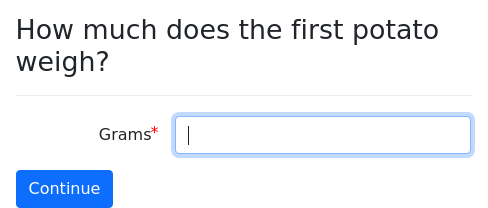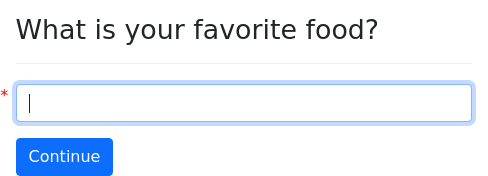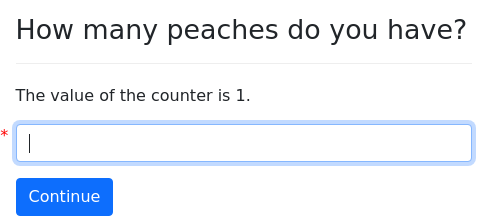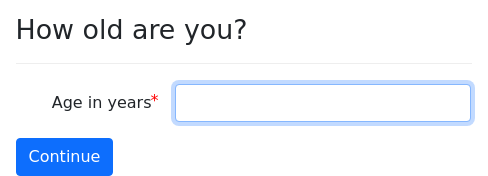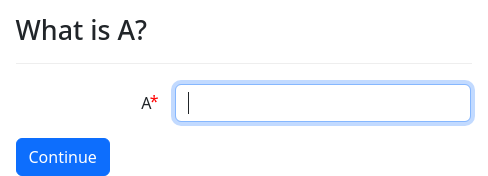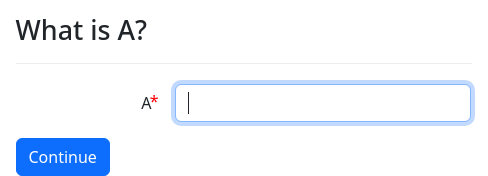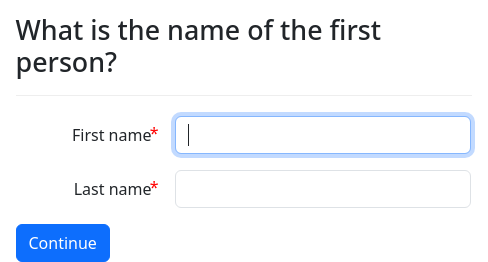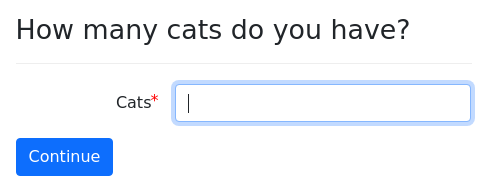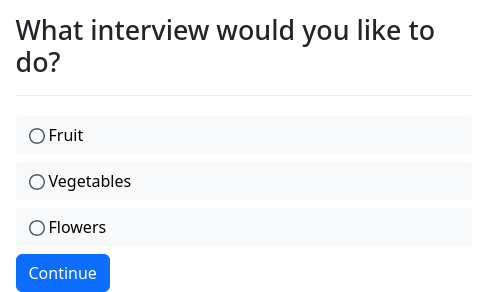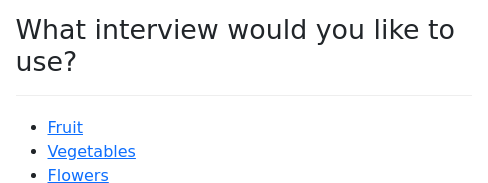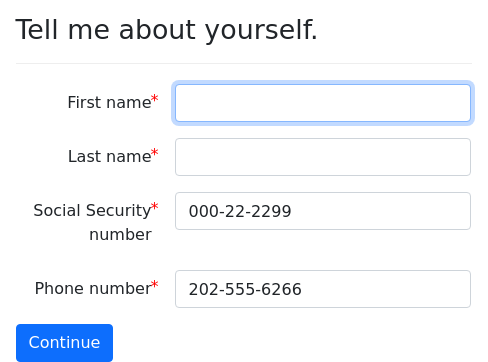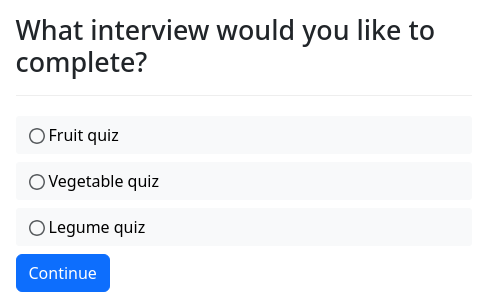Introduction
Unlike other guided interview systems, in which the interview developer maps out a decision tree or flowchart to indicate which questions should be asked and in which order, docassemble figures out what questions to ask and when to ask them based on rules that you specify. You specify these rules using YAML blocks.
Simple interviews: all blocks mandatory
The simplest type of rule you can specify is marking a block as
mandatory.
mandatory: True
question: |
Welcome to the interview!
continue button field: intro
---
mandatory: True
question: |
What is your favorite fruit?
fields:
- Fruit: favorite_fruit
---
mandatory: True
question: |
What is your favorite vegetable?
fields:
- Vegetable: favorite_vegetable
---
mandatory: True
question: |
Here is your document.
attachment:
content: |
Your favorite fruit is ${ favorite_fruit }.
% if favorite_fruit == 'apple':
You will never need to see a doctor.
% endif
Your favorite vegetable is ${ favorite_vegetable }.When docassemble runs an interview, it looks at the YAML and
tries to run each block that is marked as “mandatory.” It will run
them in the order in which they appear in the YAML. In this
example, first the “Welcome to the interview!” question is asked.
When the user clicks the “Continue” button, docassemble moves on
to the second mandatory block, which asks “What is your favorite
fruit?” When that question is answered, docassemble asks “What is
your favorite vegetable?” When that question is answered
docassemble moves on to the final question, “Here is your
document,” which lets the user download a document. This is a very
simple interview because there is no branching logic.
Suppose that instead of asking for the user’s favorite vegetable, you
wanted to ask for the user’s favorite apple, but only if the user said
that their favorite fruit is “apple.” In the previous interview, we
set mandatory to True every time, but we can actually set
mandatory to a Python expression that evaluates to a true or
false value. For example:
mandatory: True
question: |
Welcome to the interview!
continue button field: intro
---
mandatory: True
question: |
What is your favorite fruit?
fields:
- Fruit: favorite_fruit
---
mandatory: favorite_fruit == 'apple'
question: |
What is your favorite type of apple?
fields:
- Type of apple: favorite_apple
---
mandatory: True
question: |
Here is your document.
attachment:
content: |
Your favorite fruit is ${ favorite_fruit }.
% if favorite_fruit == 'apple':
Your favorite type of apple is ${ favorite_apple }.
% endifHere, the “What is your favorite type of fruit” question is only
“mandatory” if the user says that apple is their favorite type of
fruit. Thus, if the favorite_fruit variable is 'banana', then
docassemble will skip over the “What is your favorite type of
apple?” question and proceed directly to the “Here is your document”
question.
By setting the mandatory directive to a Python expression that
uses variables defined in previous question blocks, you can write
complex interviews that branch in a lot of different directions
depending on the interview answers.
However, in a complex interview with a number of nested branches of
logic, the Python expressions you will need to write to indicate
whether a question should be asked could be very long and
complicated. In the next section, we will discuss another way of
implementing branching logic that avoids this complication.
Complex interviews: dependency satisfaction
As explained in the previous section, when docassemble runs your
interview, it goes through your YAML from beginning to end and
attempts to run each block that is marked as mandatory. Marking a
question as “mandatory” is one way to tell docassemble you
want a question to be displayed.
docassemble can also do “dependency satisfaction.” For example, you can write an interview like this:
mandatory: True
question: |
Your favorite fruit is ${ favorite_fruit }.
subquestion: |
% if favorite_fruit == 'grapes':
Your favorite vineyard is ${ favorite_vineyard }.
% endif
---
question: |
Which vineyard do you think produces the best grapes?
fields:
- Vineyard: favorite_vineyard
---
question: |
What is your favorite fruit?
fields:
- Fruit: favorite_fruitIn this interview, there is a mandatory question and then two
questions that do not have a mandatory directive on them. If you
run the interview, the first question asked is “What is your favorite
fruit?” How did docassemble know it needed to ask that question,
even though it was not marked as mandatory? What happened was
that docassemble tried to display the “Your favorite fruit is …”
question, but in the process of doing so, it encountered an undefined
variable favorite_fruit. So then it looked for a block that defines
the ‘favorite_fruit’ variable, and it found one, so it asked the “What
is your favorite fruit?” question.
If the user types grapes in answer to that question, the interview
asks a follow-up question, “Which vineyard do you think produces the
best grapes?” and then proceeds to the final screen, which says “Your
favorite fruit is grapes.” However, if the user says their favorite
fruit is “apples,” the interview will skip the “Which vineyard do you
think produces the best grapes?” question and will proceed directly to
the final screen, which says “Your favorite fruit is apples.” Thus,
with a single mandatory question, the interview does branching
logic.
The branching logic is a by-product of the attempt to display the
single mandatory question. If you were to change the text of the
question and remove the reference to favorite_vineyard, the “Which
vineyard do you think produces the best grapes?” question would never
be asked. Or, if you were to change the question text to Your
favorite fruit is ${ favorite_fruit } and your favorite vegetable is
${ favorite_vegetable }. then the order of questions would change,
and the question that defines favorite_vegetable question would be
asked right after the favorite_fruit question. When dependency
satisfaction is used to ask questions, the order of questions is
determined by which variables docassemble sees first.
Note that the order in which non-mandatory questions appear in the
YAML does not affect the order in which questions are asked. Each
block in your YAML is a just a “rule,” and you can specify as
many “rules” in your YAML as you want, in any order.
For example, the following block is a rule that indicates whether the user is eligible for a benefit.
code: |
if user.age_in_years() >= 60 or user.is_disabled:
user.eligible = True
else:
user.eligible = FalseThe rule says that the user is eligible if they are 60 or older, or if they are disabled, otherwise the user is not eligible.
Rules in docassemble are instructions for how to define a
particular variable. The code block above is a rule for how to
define user.eligible. question blocks are also rules. Here is
a rule that specifies how to define user.is_disabled:
question: Are you disabled?
yesno: user.is_disabledThis says that the rule for defining user.disabled is to ask the
user a yes/no question.
It is possible to specify rules in fairly complex ways, as we will see later; you can write multiple blocks that define the same variable, so you can have alternative rules for different circumstances, or you can have a general rule that is overridden by a more specific rule in certain circumstances. You can write generic rules that apply to a variety of different variables.
When docassemble runs your interview, it will try to run your
mandatory blocks, in the order in which the blocks appear in your
YAML. In the course of trying to run a block, docassemble might
encounter a variable that hasn’t been defined yet. When this happens,
docassemble will evaluate the “rules” you have defined, and it
will run code blocks, question blocks, or other types of
blocks in order to try to obtain a definition of the undefined
variable.
In the course of trying to define a variable, docassemble might
encounter yet another undefined variable, in which case it will try to
obtain a definition of that variable, and in the course of trying to
define that variable, it may encounter yet another undefined variable.
A rule that defines a variable may “depend on” the values of other
variables. docassemble’s logic engine will perform “dependency
satisfaction” by automatically figuring out what variable definitions
are necessary and running the appropriate code blocks or showing
the appropriate question screens to the user.
This allows you, as the interview author, to specify rules and use variables in your interview or in your documents as you see fit, while docassemble does all the thinking about which questions need to be asked and in what order to ask them.
docassemble automatically refrains from asking unnecessary questions. For example, consider this example:
code: |
if user.age_in_years() >= 60 or user.is_disabled:
user.eligible = True
else:
user.eligible = FalseIf the user is 60 or older, there is no need to ask the user if they are disabled. It would waste the user’s time to ask that question. docassemble infers this from the rule. Thus “how to conduct the interview” and “what the legal rules are” are effectively the same thing, and can be specified in a single location.
Manually specifying the order of questions
Sometimes, you might not want the order of questions in the interview
to be implicitly determined by the way docassemble processes
rules; you might want to explicitly specify the order of questions.
You can do this using a code block.
mandatory: True
code: |
if favorite_fruit == 'grapes':
favorite_vineyard
favorite_vegetable
final_screen
---
event: final_screen
question: |
Your favorite fruit is ${ favorite_fruit }.
subquestion: |
Your favorite vegetable is ${ favorite_vegetable }.
% if favorite_fruit == 'grapes':
Your favorite vineyard is ${ favorite_vineyard }.
% endif
---
question: |
Which vineyard do you think produces the best grapes?
fields:
- Vineyard: favorite_vineyard
---
question: |
What is your favorite fruit?
fields:
- Fruit: favorite_fruit
---
question: |
What is your favorite vegetable?
fields:
- Vegetable: favorite_vegetableIn this interview, the mandatory code block drives the interview
using dependency satisfaction, but in an explicit order. This block
contains a few lines of Python code. The first variable encountered
is favorite_fruit, which means that the favorite_fruit question
will be asked. If favorite_fruit is 'grapes', then
favorite_vineyard is evaluated, which means that favorite_vineyard
will be asked. Then favorite_vegetable is asked, and then
final_screen is sought. Because final_screen is a special screen,
and the event directive is set to final_screen, the variable
final_screen will actually not be defined; the screen is a dead-end
screen with no fields and no “Continue” button.
If the mandatory code block was not present, and instead the
final_screen block was marked mandatory, then the questions
would have been asked in a different order: first favorite_fruit,
then favorite_vegetable, and then favorite_vineyard (if the
favorite_fruit was 'grapes'). We were able to instruct
docassemble to ask for favorite_vineyard immediately after
favorite_fruit by specifying different interview logic in the
code block.
This mandatory code block serves as an “outline” for the
interview. Instead of ordering blocks in your YAML, you can simply
order lines in your mandatory code block. The code block lets
you see the order of your interview at a glance, without having to
page through a long interview. The indentation of text under if
statements makes clear where there is a “branch” in the logic.
If you are familiar with Python, you might think that the mandatory
code block is weird, because simply putting the name of a variable
by itself on a line doesn’t do anything; it’s not something that
programmers normally do. However, it does something in
docassemble, because if the variable is undefined, a Python
exception will be “raised,” and the raising of that exception will
tell docassemble that a definition of that variable needs to be
obtained. docassemble’s dependency satisfaction system operates
through the triggering of undefined variable exceptions.
So far, we have discussed three different techniques for specifying interview logic in docassemble:
- A series of
questionblocks withmandatorydirectives on them; - Allowing
questionblocks to be asked implicitly as a result of dependency satisfaction; and - Writing a
codeblock marked asmandatorycontaining an explicit outline of the variables that need to be gathered and the conditions under which each variable definition should be sought.
These three techniques are not mutually exclusive; you can use them
together. For example, you might have a mandatory question block
followed by a mandatory code block, followed by a mandatory
question block.
mandatory: True
question: |
Welcome!
continue button field: intro_screen
---
mandatory: True
code: |
intro_screen
user.name.first
final_screen
---
mandatory: True
question: |
Your preferences.
subquestion: |
Your favorite fruit is ${ favorite_fruit }.
Your favorite vegetable is ${ favorite_vegetable }.
% if favorite_vegetable == 'turnip' and user.grows_own_turnips:
I grow turnips too!
% endifOr you could have a mandatory code block that only partially
specifies the order of questions, and allows many questions to be
asked explicitly. For example:
mandatory: True
code: |
intro_screen
user.name.first
final_screen
---
question: |
Welcome!
continue button field: intro_screen
---
event: final_screen
question: |
Your preferences.
subquestion: |
Your favorite fruit is ${ favorite_fruit }.
Your favorite vegetable is ${ favorite_vegetable }.
% if favorite_vegetable == 'turnip' and user.grows_own_turnips:
I grow turnips too!
% endifHere, the mandatory code block ensures that intro_screen and
user.name.first are asked up front, but then uses dependency
satisfaction to trigger the asking of favorite_fruit and
favorite_vegetable, as well as the display of the final_screen.
Writing law as code to drive the interview
docassemble’s “rules”-based logic system is particularly well-suited for legal applications. You can write legal logic in Python code, and docassemble will figure out how to ask the necessary questions to arrive at a legal judgment.
For example, suppose your interview needs to determine whether the user has legal standing as a grandparent to seek custody of a child. The relevant statute states that a grandparent can seek custody under the following circumstance:
(3) A grandparent of the child who is not in loco parentis to the child:
(i) whose relationship with the child began either with the consent
of a parent of the child or under a court order;
(ii) who assumes or is willing to assume responsibility for the
child; and
(iii) when one of the following conditions is met:
(A) the child has been determined to be a dependent child under
42 Pa.C.S. Ch. 63 (relating to juvenile matters);
(B) the child is substantially at risk due to parental abuse,
neglect, drug or alcohol abuse or incapacity; or
(C) the child has, for a period of at least 12 consecutive
months, resided with the grandparent, excluding brief
temporary absences of the child from the home, and is
removed from the home by the parents, in which case the
action must be filed within six months after the removal of
the child from the home.The interview developer can rewrite this statute in Python, converting each legal concept into a variable.
comment: 23 Pa. C.S.A. 5324(3)
code: |
if relationship == 'Grandparent' \
and (relationship_began_with_consent \
or relationship_began_with_court_order) \
and willing_to_assume_responsibility \
and (child_is_dependent \
or child_is_at_risk \
or cared_for_child_for_a_year):
has_grandparent_standing = True
else:
has_grandparent_standing = FalseNote: if you are wondering why there are \ marks at the end of some
of the lines, this is Python syntax for formatting source code and
avoiding writing a very long line of code. If the \ was not
present, there would be a syntax error, because Python would interpret
the newline to mean that you were done specifying a condition, and it
would think you forgot to write a : to indicate the end of the
condition. The \ basically means “ignore the following newline and
pretend this is all one long line.”
The values of a variable like relationship_began_with_consent could
be determined by asking the user a question.
question: |
At some point, did one of the child's parents agree to let you care
for the child?
yesno: relationship_began_with_consentOther variables, like cared_for_child_for_a_year, might be too
complex to reduce to a single question. In that case, rather than
using a question as the “rule” for what the variable means, you
can use a code block instead, and you can break the legal concept
down into smaller pieces.
code: |
if (not child_lives_with_client) \
and child_used_to_live_with_client \
and child_taken_from_client_by_parent \
and child_taken_within_last_six_months \
and child_moved_in_at_least_12_months_before \
and child_lived_with_client_continuously:
cared_for_child_for_a_year = True
else:
cared_for_child_for_a_year = FalseThe rules for what these variables mean can in turn be specified as
question or code blocks:
question: |
Does the child currently live with you?
yesno: child_lives_with_client
---
code: |
if as_datetime(date_child_taken_away) >= date_as_of_six_months_ago:
child_taken_within_last_six_months = True
else:
child_taken_within_last_six_months = FalseGiven YAML rules like this, docassemble can automatically
conduct a parsimonious interview; that is, it will not ask any
unnecessary questions. For example, if
willing_to_assume_responsibility is False, it will not ask
child_is_dependent. The only thing you need to do to trigger this
process is to set up a mandatory block that requires a definition
of has_grandparent_standing.
mandatory: True
code: |
if relationship == 'Grandparent' and not has_grandparent_standing:
grandparent_not_eligible
final_screen
---
event: grandparent_not_eligible
question: |
Sorry, you do not have standing as a grandparent to seek custody
under Pennsylvania law.Many beginners find this style of rule-based logic specificiation to be confusing; they would rather specify exactly which questions are asked, and exactly what happens as a result of the answer to each question. However, when there are numerous legal rules and the interaction of the legal rules leads to a large number of possible scenarios, planning in advance the interview process for each one of these scenarios is time-consuming, and the work involved is mechanical rather than substantive. If you are going to offer users the ability to spot-edit any of their prior answers to questions in the middle of the interview, you will need to think about exactly which follow-up processes are necessary when the user makes such changes.
The “declarative” style of logic is very useful in these circumstances. All you need to do is the work of a lawyer – concentrate on specifying rules that are legally correct. You can specify multiple overlapping rules, covering special cases and general cases.
How rules determine interview process
Many people envision a guided interview as a process whereby an interviewee starts at the beginning screen, then moves through a series of screens and then arrives at the end screen of the interview. At any point in time, the interviewee is envisioned as being located at a certain “place” in the interview process.
However, when the interview is driven by rules, this way of envisioning the interview process is misleading. For example, consider the following structure for an interview:
- Ask “What is your name?”
- Ask “When were you injured?”
- If the injury took place more than two years ago, say, “Sorry, the statute of limitations has expired, so you cannot file a complaint.”
- Ask “Where did the injury take place?”
- Ask “How much did you pay in medical bills?”
- Ask “How much time did you have to take off from work?”
- etc.
- Here is a complaint you can file in court.
Suppose the user started the interview one day before the statute of limitations expired, and proceeded as far as the “How much did you pay in medical bills?” question, but then took a few days to locate their medical bills, and didn’t complete the interview until a week after the statute of limitations expired. Should the guided interview allow the user to download a complaint, or should it tell the user, “Sorry, the statute of limitations has expired, so you cannot file a complaint.”? If you think of the interview process as one where the interviewee is “located” at a particular “place” in the interview, you would say that since the user has “gone past” the part of the interview process that checked for a statute of limitations problem, the user should be allowed to proceed.
The philosophy behind docassemble is that a robust interview process is one where the “current question” in the interview is determined not by which question “comes after” the previous question, but rather by the application of a set of rules to a set of facts. If there is a legal rule about the statute of limitations, it should be applied every time the screen loads, not just once at the beginning of the interview.
In docassemble, the interview logic is envisioned more as a “checklist” than a process. Each time the screen loads, docassemble reviews the checklist. What it does next depends on the application of the checklist to the current state of affairs.
By analogy, an airplane pilot will go through a checklist prior to takeoff. Whether the airline pilot turns onto the runway or goes back to the gate depends on the application of the checklist to the state of the aircraft and external factors like the weather. Likewise, what docassemble does when the screen loads depends on the application of the interview logic (specified in the YAML) to the current state of the interview answers and external factors like the date.
From the user’s perspective, the docassemble interview process looks like something that has a beginning, an end, and a “current location,” but this is really just the by-product of docassemble running through a checklist every time the screen loads. “Do we know the user’s name? Check. Has the statute of limitations expired? Check. Do we know where the injury took place? Check.”
If you observe an airplane pilot at work, you might think, “gosh, the pilot spends so much time going through boring repetitive checklists, can’t he just grab the controls and fly the plane?” Similarly, you might look at what docassemble does every time the screen loads, and you might think, “ugh, why is it wasting time going through all of this logic, can’t it just move on to the next question?” Although the checklist method is repetitive, it is robust and is capable of catching hard-to-foresee problems.
The docassemble interview developer’s job is to design the checklist that leads to the interview process, not to specify the process directly. In most situations, this is a distinction without a difference, because the developer can write something like this:
mandatory: True
code: |
user.name.first
favorite_fruit
favorite_vegetable
final_screenThis is a checklist for what should be considered every time the screen loads: “if the name is not known, ask the name. If the favorite fruit is not known, ask for the favorite fruit. If the favorite vegetable is not known, ask for the favorite vegetable. Then show the ‘final_screen’ screen.” This translates directly into a process: “first ask for the name, then the favorite fruit, then the favorite vegetable, then show the final screen.”
In more complicated interviews, the connection between the checklist and the process is less explicit. For example:
mandatory: True
code: |
user.name.first
plaintiffs.gather()
defendants.gather()
if not jurisdiction_is_proper:
kick_out_user
final_screenIn this interview, after the user is asked for their name,
docassemble gathers a list of plaintiffs and then gathers a list
of defendants. The process of gathering groups is complex and
involves multiple question blocks. The line plaintiffs.gather()
is effectively a checklist item that means “make sure the plaintiffs
are gathered.” Groups can be gathered in a variety of ways. The
questions might be “What is the name of the first plaintiff?”, “Are
there any other plaintiffs?”, “What is the name of the second
plaintiff?”, “Are there any other plaintiffs?”, etc. The line if not
jurisdiction_is_proper implicitly triggers the defining of
jurisdiction_is_proper, which is defined by a code block.
By specifying a checklist, you can ensure the integrity of your interview’s logic, control the order of questions, and use to trigger the asking of questions that it would be too tedious to specify individually. There are things you need to think about, however, to ensure that your checklist results in a process that makes sense.
Beware of non-idempotency
When designing the checklist that docassemble runs every time the screen loads, you need to be careful about how you specify the checklist items. For example, you wouldn’t want the checklist to be the following:
- Ask for the user’s name.
- Ask for the user’s date of birth.
- Give the user an assembled document.
That would mean that every time the screen loads, it would ask for the user’s name. Instead, the checklist should be:
- If the user’s name is unknown, ask them for it.
- If the user’s date of birth is unknown, ask them for it.
- Give the user an assembled document.
When you write a checklist in Python format, it looks like this:
mandatory: True
code: |
user.name.first
user.birthdate
final_screenIn docassemble, referencing the name of a variable like
user.birthdate effectively means “if user.birthdate is undefined,
stop what we are doing and seek out a definition of user.birthdate;
otherwise, proceed to the next line.”
By contrast, if you use the force_ask() function, it will always
ask the question:
mandatory: True
code: |
force_ask('user.name.first')
force_ask('user.birthdate')
final_screenHere, the first “checklist” item says that docassemble must ask a
question to determine the value of user.name.first even if the
variable is already defined. This is not what you want to do in a
checklist; the user will be confused about why the interview asks for
their name again when they just provided it. (This is is one of the
reasons why the force_ask() function is rarely used.)
docassemble allows you to run Python functions inside of a checklist, and in most situations this works as expected. For example:
mandatory: True
code: |
user.name.first
user.birthdate
if not record_exists_in_database_for(user):
error_screen
final_screenHere, there is a function called record_exists_in_database_for()
that looks up the user based on the user’s name and birthdate. It is
ok if this function runs every time the screen loads.
However, beginning developers sometimes assume that they can do this:
mandatory: True
code: |
user.name.first
user.email
send_email(to=user, subject="Welcome", body="Welcome to the interview!")
user.birthdate
final_screenThis means that after the user provides their name and e-mail address, docassemble will send them an e-mail. However, it also means that every time the screen loads thereafter, docassemble will send another e-mail! The checklist item should have been written in such a way that the e-mail is only sent once:
mandatory: True
code: |
user.name.first
user.email
if not task_performed('welcome_email'):
send_email(to=user, subject="Welcome", body="Welcome to the interview!", task='welcome_email')
user.birthdate
final_screenThe task_performed() function, combined with the task paramater
of the send_email() function, is one way to ensure that code only
runs once. Another method is to use a separate code block that
defines a variable:
mandatory: True
code: |
user.name.first
user.email
email_sent
user.birthdate
final_screen
---
code: |
send_email(to=user, subject="Welcome", body="Welcome to the interview!")
email_sent = TrueThe logic behind the email_sent line is: “if email_sent is not
defined, run the code block in order to define it; otherwise continue
to the next line.”
Another mistake that beginning developers sometimes make is writing a checklist that results in the user seeing a different screen if they refresh the screen without providing input. For example, consider this interview:
mandatory: True
code: |
user.name.first
user.email
if not task_performed('data_stored'):
store_data(user)
mark_task_as_performed('data_stored')
user.wants_email
if user.wants_email:
send_email(to=user, template=confirmation_email)
user.birthdate
final_screen
---
question: |
Do you want a confirmation e-mail?
yesno: user.wants_emailIn this example, after the user provides their e-mail address,
docassemble will run the store_data() function, then it will
mark the data_stored “task” as having been completed, and then it
will see that user.wants_email is undefined, so it will ask the user
if they would like to receive a confirmation e-mail. Suppose that the
user, instead of answering the question, refreshes the screen. The
interview logic will be evaluated again. Now, since the data_stored
“task” has been marked as complete, the Python code skips the if
clause and asks the user for user.birthdate. But this defeats the
user’s expectation; the user reasonably expects that when they refresh
the screen, they will see the user.wants_email question again. The
problem is with the interview logic.
Software developers use the term “idempotent” to describe a system that produces the same result if an action is repeated. The interview logic in this circumstance is not idempotent because when it is repeated, a different result is produced.
Normally, your “checklist” should be designed to result in idempotent behavior. The exception would be if the passage of time has made the “current question” obsolete. For example, if the user started the interview before the statute of limitations period expired, and then tried to continue with the interview after the statute of limitations period expired, it would be reasonable for the user to see a different screen when they refreshed the screen.
Another consequence of non-idempotent logic is that users might see a
pop-up message saying “Input not processed.” This is because of a
security feature in docassemble: if the browser tries to submit
input for a question that is different from what the current
question is according to the interview logic, docassemble will
reject the browser’s attempt to change the interview answers. In the
example above, if the user clicked “Yes” or “No” in response to the
question “Do you want a confirmation e-mail?”, the user would have
seen an “Input not processed” error and been sent to the
user.birthdate question.
To fix the idempotency problem, you could take the e-mail sending code out of the conditional statement:
mandatory: True
code: |
user.name.first
user.email
if not task_performed('data_stored'):
store_data(user)
mark_task_as_performed('data_stored')
user.wants_email
if user.wants_email:
send_email(to=user, template=confirmation_email)
user.birthdate
final_screenWriting idempotent logic is also important because of the way that
docassemble runs code blocks. Consider the following
interview, which has a code block for calculating the user’s total
income:
mandatory: True
question: |
Tell me about your income and expenses.
fields:
- Benefits income: benefits_income
datatype: currency
- Business income: business_income
datatype: currency
- Business expenses: business_expenses
datatype: currency
---
mandatory: True
code: |
total_income = 0.0
---
mandatory: True
code: |
total_income = total_income + benefits_income
total_income = total_income + net_business_income
---
code: |
net_business_income = business_income - business_expenses
---
mandatory: True
question: |
Your total income is ${ currency(total_income) }.At first glance, this logic looks correct; the interview gathers
information from the user, initializes total_income to zero, then
adds the benefits income and the net business income to
total_income. However, you will find that the calculation is
incorrect; benefits_income will be counted twice.
The problem is that this code block is not idempotent:
mandatory: True
code: |
total_income = total_income + benefits_income
total_income = total_income + net_business_incomeIf this code runs more than once, the total_income will be increased
each time. If you try to run this interview, this code block will run
more than once. The first time it runs, it adds benefits_income to
total_income, but then stops because net_business_income is
undefined. docassemble obtains a definition of
net_business_income in microseconds by running the code block that
defines net_business_income. But after it does that, it does not
resume where it left off (adding net_business_income to
total_income). It will repeat the code block again, from the
beginning. So benefits_income will be added to total_income a
second time, and then net_business_income will be added, and then
the “mandatory” block will be marked as having been completed, because
it ran through all the way to the end.
If you are familiar with computer programming, docassemble works
by trapping exceptions. When Python encounters an undefined variable,
it raises an exception. docassemble traps that exception, figures
out what variable was undefined, and then tries to define it. It does
this either by asking the user a question or by running a ‘code’
block. Either way, the exception halts code execution, and Python is
unable pick up exactly where it left off when the exception was
raised.
The solution to this problem is to write the code block so that it
can be run repeatedly without making a miscalculation:
mandatory: True
code: |
total_income = 0
total_income = total_income + benefits_income
total_income = total_income + net_business_incomeThis way, the code will produce the correct total no matter how many undefined variables docassemble encounters along the way.
Inexperienced developers also sometimes make the error of assuming
that all code blocks will run to completion. For example, suppose
that the above interview was written like this, with only one
mandatory block:
question: |
Tell me about your income and expenses.
fields:
- Benefits income: benefits_income
datatype: currency
- Business income: business_income
datatype: currency
- Business expenses: business_expenses
datatype: currency
---
code: |
total_income = 0.0
total_income = total_income + benefits_income
total_income = total_income + net_business_income
---
code: |
net_business_income = business_income - business_expenses
---
mandatory: True
question: |
Your total income is ${ currency(total_income) }.This interview appears to be reasonable, but actually it contains a
flaw. When docassemble tries to show the mandatory question, it
encounters an undefined variable total_income, so it seeks out a
definition of total_income. It tries to run this code block:
code: |
total_income = 0.0
total_income = total_income + benefits_income
total_income = total_income + net_business_income
docassemble sets total_income to zero, and then encounters an
undefined variable, benefits_income, so it asks the question that
defines benefits_income. However, what if the user refreshed the
screen on the question that asks for the benefits_income?
docassemble would attempt to show the mandatory question again,
and this time total_income is defined, so docassemble can
display the screen, which says that the total income is zero. “But
wait,” you say, “it didn’t finish running the code block that
defines total_income!” True, but the rule of docassemble’s
logic is that it goes through your YAML, runs mandatory blocks
that haven’t been run before, and tries to obtain definitions for any
undefined variables that are encountered along the way. Nothing in
this rule says that it will remember if it left a code block early
and go back to it.
The moral of the story is that if you are going to use dependency
satisfaction, do not allow your dependencies to be satisfied
prematurely. The code block should be written instead as:
code: |
total_income = benefits_income + net_business_incomeor
code: |
total_income = benefits_income + net_business_income
draft_total_income = 0.0
draft_total_income = total_income + benefits_income
draft_total_income = total_income + net_business_income
total_income = draft_total_income
del draft_total_incomeYou can think of the undefined-ness of a variable as docassemble’s incentive to obtain the definition of the variable. It is like hiring a busy contractor to do work on your house; if you give the contractor his final payment after he is only halfway done with the job, he might leave at the end of the day and forget to come back later to finish the work.
You might be tempted to combine the definition of several variables in
a single code block, perhaps because you think it saves space or is
easier to read:
code: |
subtotal = 0
for item in asset:
if item.countable:
subtotal = subtotal + item.value
total_assets = subtotal
temp_list = []
for item in income:
if item.included and item.type not in income.items:
temp_list.append(item.type)
income_items = temp_list
Think about what will happen if the interview needs a value of
total_assets. It will run the code block, and halfway through,
the value of total_assets will be obtained. But the code will not
stop executing; it will go on to start building the income_items
list. This will work fine if the income list has been completely
gathered, but what if it has not been? Then the code block may
result in the asking of a question about the income list, but if the
user refreshes the screen, that question will go away. This
introduces an idempotency problem.
It is a much better practice to separate your code into single-purpose
code blocks:
code: |
subtotal = 0
for item in asset:
if item.countable:
subtotal = subtotal + item.value
total_assets = subtotal
---
code: |
temp_list = []
for item in income:
if item.included and item.type not in income.items:
temp_list.append(item.type)
income_items = temp_list
This way, no matter whether your interview needs total_assets first
or income_items first, and regardless of whether it has already
gathered income or asset, these code blocks will perform their
function and deliver a definition without causing any non-idempotent
questions to be asked.
As a general rule, let each code block serve a single purpose, or a
set of closely-related purposes, and let it deliver its award (the
defining of the variable sought) on the last line. If you get into
this habit, you will avoid hard-to-debug logic errors.
Although typically your non-mandatory code blocks should only set
one variable at a time, it is ok if they set other variables
incidentally. However, in that situation you should probably use the
only sets modifier.
For example, suppose you have an interview in which you want to ask
the user, “Do you receive income from public benefits?”, and you want
to set the variable has_benefits to the answer, but as a
double-check on the validity of the answer, you want to set
has_benefits to True during the income gathering process if the
user indicates that they have income from disability or welfare
income.
question: |
Do you receive income from public benefits?
yesno: has_benefits
---
code: |
temp_total = []
for item in income:
if item.included and item.type not in income.items:
temp_total.append(item.type)
if item.type in ['disability', 'welfare']:
has_benefits = True
total_income = temp_totalThe problem here is that the income gathering question will now be
called upon to set has_benefits. If has_benefits is needed before
total_income, the interview will start asking about income items,
but will mysteriously stop in the middle of the process if the user
enters a disability or welfare income item. Then, when total_income
is needed later in the interview, it will resume asking questions
about the income items. It would be better if you used only sets:
only sets: total_income
code: |
temp_total = []
for item in income:
if item.included and item.type not in income.items:
temp_total.append(item.type)
if item.type in ['disability', 'welfare']:
has_benefits = True
total_income = temp_totalThat way, the code block will only be called upon to define
total_income. It can still have the side effect of setting
has_benefits to True, but it will not be called upon to define
anything other than total_income.
The logical order of an interview
In the previous sections, we have explained that when docassemble
runs your interview, it goes through your YAML looking for blocks
that are mandatory, and it tries to run them in order. When it
encounters an undefined variable, it stops what it is doing and tries
to obtain a definition of that undefined variable.
If a mandatory question is answered, or a
mandatory code block’s Python code runs all the
way through to end, then docassemble remembers that the
mandatory block has been completed, and the next time it evaluates
the interview logic, it will skip over the block.
(Technical note: how does docassemble remember that a block has
been completed? It stores a variable in the interview answers, inside
of a special dictionary called _internal. In order to identify the
blocks that have been completed, it uses the block’s id. If you
do not specify an id on a mandatory block, docassemble
will generate an identifier like Question_0 or Question_1 for the
first and second blocks in your YAML file. This means that if you
have an interview that is “in production” and users have active
sessions in that interview, and then you change the YAML to insert
new blocks or move them around, you could cause these identifiers to
change, and then users who started sessions before you changed the
YAML could experience problems where questions they have already
answered are re-asked. In order to avoid this problem, make sure to
attach a unique id to each mandatory block in your interview.
That way, even if you rearrange the YAML, users with existing
sessions will not experience problems.)
In addition to mandatory, there is a second type of modifier you
can use to force a code block to be processed. If you mark a
code block with initial: True, then the block will be run every
time the screen loads, even if it has run before. The block is
“initial” in the sense that it initializes the interview logic that
will be evaluated during the screen load.
mandatory and initial blocks are evaluated in the order they
appear in the question file. Therefore, the location in the interview
of mandatory and initial blocks, relative to each other, is
important.
The order in which non-mandatory and non-initial questions
appear is usually not important. If docassemble needs a
definition of a variable, it will go looking for a block that defines
the variable.
Consider the following example:
question: |
Do you like penguins?
yesno: user_likes_penguins
---
question: |
Do you like elephants?
yesno: user_likes_elephants
---
mandatory: true
question: |
Hello!
buttons:
- Hello to you: continue
---
mandatory: true
question: |
What is your name?
fields:
- Name: user_name
---
mandatory: true
question: |
Your favorite food is
${ favorite_food }.
% if user_likes_penguins:
You are a fan of penguins.
% else:
You detest penguins, for some
strange reason.
% endif
---
question: |
What is your favorite food?
fields:
- Favorite food: favorite_foodThe order of the questions is:
- Hello!
- What is your name?
- What is your favorite food?
- Do you like penguins?
The first two questions are asked because the corresponding
question blocks are marked as mandatory. They are asked in
the order in which they are asked because of the way the question
blocks are ordered in the YAML file.
The next two questions are asked implicitly. The third and final
mandatory block makes reference to two variables: favorite_food
and user_likes_penguins. Since the questions that define these
variables are not mandatory, they can appear anywhere in the YAML
file, in any order you want. In this case, the favorite_food
question block is at the end of the YAML file, and the
user_likes_penguins question block is at the start of the YAML
file.
The order in which these two questions are asked is determined by the
order of the variables in the text of the final mandatory
question. Since favorite_food is referenced first, and
user_likes_penguins is referenced afterwards, the user is asked
about food and then asked about penguins.
Note that there is also an extraneous question in the interview that
defines user_likes_elephants; the presence of this question
block in the YAML file has no effect on the interview.
Generally, you can order non-mandatory blocks in your YAML file
any way you want. You may want to group them by subject matter into
separate YAML files that you include in your main YAML file.
When your interviews get complicated, there is no natural order to
questions. In some situations, a question may be asked early, and in
other situations, a question may be asked later.
Overriding one question with another
The order in which non-mandatory blocks appear in the YAML file
is only important if you have multiple blocks that each offer to
define the same variable. In that case, the order of these blocks
relative to each other is important. When looking for blocks that
offer to define a variable, docassemble will use later-defined
blocks first. Later blocks “supersede” the blocks that came before.
This allows you to include “libraries” of questions in your
interview while retaining the ability to customize how any particular
question is asked.
As explained in the initial blocks section, the effect of an
include block is basically equivalent to copying and pasting the
contents of the included file into the original file.
For example, suppose that there is a YAML file called
question-library.yml, which someone else wrote, which consists of
the following questions:
question: |
Nice evening, isn't it?
yesno: user_agrees_it_is_a_nice_evening
---
question: |
Interested in going to the dance tonight?
yesno: user_wants_to_go_to_danceYou can write an interview that uses this question library:
include:
- question-library.yml
---
mandatory: True
code: |
if user_agrees_it_is_a_nice_evening and user_wants_to_go_to_dance:
good_news
---
mandatory: True
question: |
Say, I have to run. Bye!
---
event: good_news
question: |
That is splendid news!When docassemble needs to know the definition of
user_agrees_it_is_a_nice_evening or user_wants_to_go_to_dance, it
will be able to find a block in question-library.yml that offers to
define the variable.
Suppose, however, that you thought of a better way to ask the
user_wants_to_go_to_dance question, but you don’t want to get rid of
question-library.yml entirely. You could override the
user_wants_to_go_to_dance question in question-library.yml by
doing the following:
include:
- question-library.yml
---
question: |
So, about that dance tonight . . .
wanna go?
yesno: user_wants_to_go_to_dance
---
mandatory: True
code: |
if user_agrees_it_is_a_nice_evening and user_wants_to_go_to_dance:
good_news
---
mandatory: True
question: |
Say, I have to run. Bye!
---
event: good_news
question: |
That is splendid news!This interview file loads the two questions defined in
question-library.yml, but then, later in the list of questions,
provides a different way to get the value of
user_wants_to_go_to_dance. When docassemble goes looking for a
question to provide a definition of user_wants_to_go_to_dance, it
starts with the questions that were defined last, and it will
prioritize your question over the question in question-library.yml.
Your question block takes priority because it is located later in
the YAML file.
This is similar to the way law works: old laws do not disappear from the law books, but they can get superseded by newer laws. “Current law” is simply “old law” that has not yet been superseded.
A big advantage of this feature is that you can include “libraries” written by other people without having to edit those other files in order to tweak them. You can use another person’s work without taking on the responsibility of maintaining that person’s work over time; you can just incorporate by reference that person’s file, which they continue to maintain.
For example, if someone else has developed interview questions that determine a user’s eligibility for food stamps, you can incorporate by reference that developer’s YAML file into an interview that assesses whether a user is maximizing his or her public benefits. When the law about food stamps changes, that developer will be responsible for updating his or her YAML file; your interview will not need to change. This allows for a division of labor. All you will need to do is make sure that the docassemble package containing the food stamp YAML file gets updated on the server when the law changes.
Fallback questions
If a code block does not, for whatever reason, actually define the
variable, docassemble will “fall back” to a block that is located
earlier in the YAML file. For example:
include:
- question-library.yml
---
question: |
I forgot, did we already agree to go to the dance together?
yesno: we_already_agreed_to_go
---
code: |
if we_already_agreed_to_go:
user_wants_to_go_to_dance = True
---
mandatory: True
code: |
if user_agrees_it_is_a_nice_evening and user_wants_to_go_to_dance:
good_news
---
mandatory: True
question: |
Say, I have to run. Bye!
---
event: good_news
question: |
That is splendid news!In this case, when docassemble tries to get a definition of
user_wants_to_go_to_dance, it will first try running the code
block, and then it will encounter we_already_agreed_to_go and seek
its definition. If the value of we_already_agreed_to_go turns out
to be false, the code block will run its course without setting a
value for user_wants_to_go_to_dance. Not giving up,
docassemble will keep going backwards through the blocks in the
YAML file, looking for one that offers to define
user_wants_to_go_to_dance. It will find such a question among the
questions included by reference from question_library.yml, namely
the question “Interested in going to the dance tonight?”
This “fall back” process can also happen with special question
blocks that use the continue option.
include:
- question-library.yml
---
question: Which of these statements is true?
choices:
- "I am old-fashioned":
question: |
My darling, would you do me the
honor of accompanying me to
the dance this fine evening?
yesno: user_wants_to_go_to_dance
- "I don't care for flowerly language": continue
---
mandatory: True
code: |
if user_agrees_it_is_a_nice_evening and user_wants_to_go_to_dance:
good_news
---
mandatory: True
question: |
Say, I have to run. Bye!
---
event: good_news
question: |
That is splendid news!In this case, the special continue choice causes docassemble
to skip the question block and look elsewhere for a definition of
user_wants_to_go_to_dance. docassemble will “fall back” to the
version of the question that exists within question-library.yml.
When looking for a block that offers to define a variable,
docassemble starts at the bottom and works its way up.
(Note that questions using continue are of limited utility
because they cannot use the generic object modifier or index
variables. However, code blocks do not have this limitation.)
So, to recapitulate: when docassemble considers what blocks it
must process, it goes from top to bottom through your interview
YAML file, looking for mandatory and initial blocks; if a
block is later in the file, it is processed later in time. However,
when docassemble considers what question it should ask to define a
particular variable, it goes from bottom to top; if a block is later
in the file, it is considered to “supersede” blocks that are earlier
in the file.
As explained below, however, instead of relying on relative placement of blocks in the YAML file, you can explicitly indicate which blocks take precedence over other blocks.
How docassemble runs your code
docassemble goes through your interview YAML file from start to
finish, incorporating included files as it goes. It always
executes initial code when it sees it. It executes any
mandatory code blocks that have not been
successfully executed yet. If it encounters a
mandatory question that it has not been
successfully asked yet, it will stop and ask the question.
If at any time it encounters a variable that is undefined, for example while trying to formulate a question, it will interrupt itself in order to go find the a definition for that variable.
Whenever docassemble comes back from one of these excursions to find the definition of a variable, it does not pick up where it left off; it starts from the beginning again.
Therefore, when writing code for an interview, you need to keep in mind that any particular block of code may be re-run from the beginning multiple times.
For example, consider the following code:
---
mandatory: True
code: |
if user_has_car:
user_net_worth = user_net_worth + resale_value_of_user_car
if user_car_brand == 'Toyota':
user_is_sensible = True
elif user_car_is_convertible:
user_is_sensible = False
---The intention of this code is to increase the user’s net worth by the resale value of the user’s car, if the user has a car. If the code only ran once, it would work as intended. However, because of docassemble’s design, which is to ask questions “as needed,” the code actually runs like this:
- docassemble starts running the code; it encounters
user_has_car, which is undefined. It finds a question that definesuser_has_carand asks it. (We will assumeuser_has_caris set to True.) - docassemble runs the code again, and tries to increment the
user_net_worth(which we can assume is already defined); it encountersresale_value_of_user_car, which is undefined. It finds a question that definesresale_value_of_user_carand asks it. - docassemble runs the code again. The value of
user_net_worthis increased. Then the code encountersuser_car_brand, which is undefined. It finds a question that definesuser_car_brandand asks it. - docassemble runs the code again. The value of
user_net_worthis increased (again). Ifuser_car_brandis equal to “Toyota,” thenuser_is_sensibleis set. In that case, the code runs successfully to the end, and themandatorycode block is marked as completed, so that it will not be run again. - However, if
user_car_brandis not equal to “Toyota,” the code will encounteruser_car_is_convertible, which is undefined. docassemble will find a question that definesuser_car_is_convertibleand ask it. docassemble will then run the code again, the value ofuser_net_worthwill increase yet again, and then (finally) the code will run successfully to the end.
The solution here is to make sure that your code is prepared to be
stopped and restarted. For example, you could have a separate code
block to compute user_net_worth:
---
mandatory: True
code: |
user_net_worth = 0
if user_has_car:
user_net_worth = user_net_worth + resale_value_of_user_car
if user_has_house:
user_net_worth = user_net_worth + resale_value_of_user_house
---Note that mandatory must be true for this to work sensibly.
If this were an optional code block, it would not run to completion
because user_net_worth would already be defined when docassemble
came back from asking whether the user has a car.
How docassemble finds questions for variables
There can be multiple questions or code blocks in an interview that
can define a given variable. You can write generic object
questions in order to define attributes of objects, and you can use
index variables to refer to any given item in a DAList or
DADict (or a subtype of these objects). Which one will be used?
In general, if you have multiple questions or code blocks that are capable of defining a variable, docassemble will try the more specific ones first, and then the more general ones.
For example, if the interview needs a definition of
fruit['a'].seed_info.tally['b'].molecules[4].name, it will look for
questions that offer to define the following variables, in this order:
fruit['a'].seed_info.tally['b'].molecules[4].name
fruit[i].seed_info.tally['b'].molecules[4].name
fruit['a'].seed_info.tally[i].molecules[4].name
fruit['a'].seed_info.tally['b'].molecules[i].name
fruit[i].seed_info.tally[j].molecules[4].name
fruit[i].seed_info.tally['b'].molecules[j].name
fruit['a'].seed_info.tally[i].molecules[j].name
fruit[i].seed_info.tally[j].molecules[k].nameThen it will look for generic object blocks that offer to define
the following variables, in this order:
x['a'].seed_info.tally['b'].molecules[4].name
x[i].seed_info.tally['b'].molecules[4].name
x['a'].seed_info.tally[i].molecules[4].name
x['a'].seed_info.tally['b'].molecules[i].name
x[i].seed_info.tally[j].molecules[4].name
x[i].seed_info.tally['b'].molecules[j].name
x['a'].seed_info.tally[i].molecules[j].name
x[i].seed_info.tally[j].molecules[k].name
x.seed_info.tally['b'].molecules[4].name
x.seed_info.tally[i].molecules[4].name
x.seed_info.tally['b'].molecules[i].name
x.seed_info.tally[i].molecules[j].name
x.tally['b'].molecules[4].name
x.tally[i].molecules[4].name
x.tally['b'].molecules[i].name
x.tally[i].molecules[j].name
x['b'].molecules[4].name
x[i].molecules[4].name
x['b'].molecules[i].name
x[i].molecules[j].name
x.molecules[4].name
x.molecules[i].name
x[4].name
x[i].name
x.nameMoreover, when docassemble searches for a generic object
question for a given variable, it first look for generic object
questions with the object type of x (e.g., Individual). Then it
will look for generic object questions with the parent type of
object type of x (e.g., Person). It will keep going through the
ancestors, stopping at the most general object type, DAObject.
Note that the order of questions or code blocks in the YAML matters
where the variable name is the same; the blocks that appear later in
the YAML will be tried first. But when the variable name is
different, the order of the blocks in the YAML does not matter.
If your interview has a question that offers to define
seeds['apple'] and another question that offers to define
seeds[i], the seeds['apple'] question will be tried first,
regardless of where the question is located in the the YAML.
Here is an example in which a relatively specific question, which sets
veggies[i][1], will be used instead of a more general question,
which sets veggies[i][j], when applicable:
question: |
How much does the other
${ i } weigh?
fields:
- Grams: veggies[i][1]
datatype: number
---
question: |
How much does the
${ ordinal(j) }
${ i } weigh?
fields:
- Grams: veggies[i][j]
datatype: numberThese rules about which blocks are tried
before other blocks can be overriden using the order initial block
or the id and supersedes modifiers. You can use the if
modifier to indicate that a given question should only be asked
under certain conditions. You can use the scan for variables
modifier to indicate that a question or code block should
only be considered when looking to define a particular variable or set
of variables, even though it is capable of defining other variables.
Specifiers that control interview logic
mandatory
By default, all blocks in an interview are optional; they will be
called upon only if needed to retrieve the value of a variable.
However, if all blocks are optional, the interview has nothing to do.
You can use the mandatory modifier to indicate that a block must be
run. The first mandatory block in your interview will be the
starting point of the interview logic when the user first starts the
interview.
Consider the following as a complete interview file:
---
question: What is the capital of Maine?
fields:
- Capital: maine_capital
---
question: Are you sitting down?
yesno: user_sitting_down
mandatory: True
---
question: Your socks do not match.
mandatory: True
---The interview will ask “Are you sitting down” and then it will say “Your socks do not match.” It will not ask “What is the capital of Maine?”
Another way to control the logic of an interview is to have a single,
simple mandatory code block that sets the
interview in motion.
For example:
---
mandatory: True
code: |
if user_sitting_down:
user_informed_that_socks_do_not_match
else:
user_will_not_sit_down
---
question: What is the capital of Maine?
fields:
- Capital: maine_capital
---
question: Are you sitting down?
yesno: user_sitting_down
---
question: Your socks do not match.
sets: user_informed_that_socks_do_not_match
---
question: You really should have sat down.
subquestion: I had something important to tell you.
sets: user_will_not_sit_down
---Here, the single mandatory block contains simple Python code that
contains the entire logic of the interview.
If a mandatory specifier is not present within a block, it is as
though mandatory was set to False.
The value of mandatory can be a Python expression. If it is a
Python expression, the question or code block will be
treated as mandatory if the expression evaluates to a true value.
mandatory: |
favorite_food == "apples"
question: |
You have good taste in food.
buttons:
- Continue: continue
---
mandatory: True
question: |
Thank you for your input.
---
question: |
What is your favorite food?
fields:
- no label: favorite_foodIt is a best practice to tag all mandatory blocks with an id.
initial
The initial modifier causes the code block to be run every time
docassemble processes your interview (i.e., every time the screen
loads during an interview). mandatory blocks, by contrast, are
never run again during the session if they are successfully “asked”
once. docassemble executes the code in an initial block in
the same way it executes the code of mandatory blocks, except that
running to completion does not mean the block will not be executed again.
initial blocks should be used in the following situations:
- “Initializing” the Python context in a multi-user interview
depending on who the user is. For example, if your interview uses a
variable
userthat should always refer to anIndividualobject corresponding to the user, you can write aninitialblock that looks atuser_info().emailto figure out who the logged-in user is. - When you are using the actions feature and you want to make sure the actions are processed only in particular circumstances.
Here is an example that illustrates how initial blocks work:
mandatory: True
code: |
counter = 0
---
initial: True
code: |
counter = counter + 1
---
question: |
How many peaches do you have?
subquestion: |
The value of the counter
is ${ counter }.
fields:
- no label: peaches
datatype: integer
---
code: |
fruits = peaches + pears
---
question: |
How many pears do you have?
subquestion: |
The value of the counter
is ${ counter }.
fields:
- no label: pears
datatype: integer
---
question: |
You have ${ fruits } pieces of fruit.
subquestion: |
The value of the counter
is ${ counter }.
mandatory: TrueNote in this example that from screen to screen, the counter
increments from 1 to 3 and then to 6. The counter does not count the
number of screens displayed, but rather the number of times the
interview logic was evaluated. The number of times the interview logic
gets evaluated is hard to predict, but you can count on it being
evaluated many times, so you need to make sure you write your logic in
an idempotent manner.
On every screen load, the interview logic is evaluated prior to
processing the input in order to ensure that the input is responding
to whatever the current question is. docassemble needs to
evaluate the interview logic in order to know what the current
question is. It is then evaluated after the input is processed, so
that the user can be presented with the next question. In addition,
the interview logic will be re-evaluated when an undefined variable is
encountered and a code block provides the value of a variable.
- The interview logic is evaluated, but the evaluation stops when the
undefined variable
fruitis encountered. The interview then tries to run thecodeblock to getfruit, but encounters an undefined variablepeaches, so it asks a question to gatherpeaches. - The interview logic is evaluated, but the evaluation stops when the
undefined variable
fruitis encountered. The interview then tries to run thecodeblock to getfruit, but encounters an undefined variablepears, so it asks a question to gatherpears. - The interview logic is evaluated, but the evaluation stops when the
undefined variable
fruitis encountered. The interview then runs thecodeblock, and this time,fruitis successfully defined. - The interview logic is evaluated again, and the final question is displayed.
Like mandatory, initial can be set to True, False, or to
Python code that will be evaluated to see whether it evaluates to a
true or false value.
If your interview has a single mandatory code block and it is
incapable of running to completion, then you don’t really need an
initial block because you can put the logic that needs to run every
time the screen loads at the beginning of that mandatory block.
need
The need specifier allows you to manually specify the prerequisites
of a question or code block. This can be helpful for tweaking
the order in which questions are asked.
mandatory: True
need:
- number_of_years_old
- favorite_animal
question: |
Thank you for that information.
subquestion: |
My favorite animal is
${ favorite_animal },
too!
% if number_of_years_old < 10:
You're growing so fast. Pretty
soon you'll be driving a
${ favorite_color } car!
% endifIn this example, the ordinary course of the interview logic would ask
“What is your favorite animal?” as the first question. However,
everyone knows that the first question you should ask of a child is
“How old are you?” The need specifier indicates that before
docassemble should even try to present the “Thank you for that
information” screen, it should ensure that number_of_years_old old
is defined, then ensure that favorite_animal, and then try to
present the screen.
The variables listed in a need specifier do not have to actually be
used by the question. Also, if your question uses variables that are
not mentioned in the need list, docassemble will still pursue
definitions of those variables.
If any of the variables listed under need are undefined,
docassemble will obtain their definitions before processing the
content of the question. For example, suppose you have the
following question:
need:
- favorite_fruit
question: |
Your favorite apple is ${ favorite_apple }.
continue button field: fruit_verifiedIf both favorite_fruit and favorite_apple are undefined, the
definition of favorite_fruit will be sought first.
What if you wanted favorite_fruit to be sought after
favorite_apple? To do this, you can use the following special form
of need:
need:
post:
- favorite_fruit
question: |
Your favorite apple is ${ favorite_apple }.
continue button field: fruit_verifiedIn this case, the definition of favorite_fruit will be sought after
all of the prerequisites of the question have been satisfied.
You can organize your need items into pre and post items:
need:
pre:
- favorite_vegetable
post:
- favorite_fruitYou can also include post among a list of other items:
need:
- favorite_vegetable
- post:
- favorite_fruitdepends on
The depends on specifier indicates that if the listed variables
change, the results of the question or code block should be
invalidated.
question: |
What is A?
fields:
- A: a
datatype: number
---
question: |
What is the square of ${ a }?
fields:
- B: b
datatype: number
depends on:
- a
---
code: |
c = a + b
depends on:
- a
- b
---
event: review_screen
skip undefined: False
question: |
Review your answers.
review:
- label: Edit A
field: a
button: |
A is ${ a }.
- label: Edit B
field: b
button: |
B is ${ b }.
- note: |
C is ${ c }.
---
mandatory: True
code: |
need(a, b, c)
review_screenIn this example, if the user goes through the interview to the end,
but then edits a, then if and when a is changed to a different
value, c and b will be undefined. The original value of b will
be remembered, so that when the interview logic asks the question to
define b, the original value will be presented as a default. When
a is set, c is also undefined, so that when the interview logic
requires a definition of c, the code block will be run to
recompute the value of c.
If the user goes through the interview and then edits b, a change in
b will trigger the invalidation of c.
The depends on specifier will also cause variables to be invalidated
when they are changed by a code block.
question: |
What is A?
fields:
- A: a
datatype: number
---
code: |
b = a * a
depends on:
- a
---
code: |
c = a + b
depends on:
- a
- b
---
event: review_screen
skip undefined: False
question: |
Review your answers.
review:
- label: Edit A
field: a
button: |
A is ${ a }.
- note: |
B is ${ b }.
- note: |
C is ${ c }.
---
mandatory: True
code: |
need(a, b, c)
review_screenIn this interview, the variable b is set by a code block. If
the user edits a to a different value, the depends on specifier on
the code block causes the code block to be re-run. The change
in b causes the value of c to be invalidated. As a result, c is
automatically updated when a changes.
Note that the depends on specifier results in invalidation when a
variable is changed, not when it is defined. If a variable is
undefined and is then defined, this is not considered a change for
purposes of the depends on specifier. If a user presses Continue on
a screen but does not change the value of a variable, the depends on
logic is not triggered.
The depends on specifier can be used with iterator variables.
objects:
- people: DAList.using(object_type=Individual, there_are_any=True, complete_attribute='complete')
---
question: |
How much does ${ people[i] }
get paid per pay period?
fields:
- Amount: people[i].income
datatype: currency
depends on:
- people[i].pay_period
---
question: |
How frequently does
${ people[i] } get paid?
fields:
- no label: people[i].pay_period
datatype: number
choices:
- Monthly: 12.0
- Biweekly: 26.0
- Semi-monthly: 24.0
- Weekly: 52.0
---
code: |
people[i].annual_income = people[i].income * people[i].pay_period
depends on:
- people[i].pay_period
- people[i].income
---
question: |
What is the name of the
${ ordinal(i) } person?
fields:
- First name: people[i].name.first
- Last name: people[i].name.last
---
code: |
people[i].name.first
people[i].annual_income
people[i].complete = True
---
question: |
Is there another person?
yesno: people.there_is_another
---
field: review_screen
question: Review
subquestion: |
${ people.table }
${ people.add_action() }
---
table: people.table
rows: people
columns:
- Name: row_item.name
- Annual income: currency(row_item.annual_income)
edit:
- name.first
- pay_period
---
event: final_screen
question: Summary
subquestion: |
% for person in people:
${ person }
makes
${ currency(person.income) }
${ nice_number(person.pay_period) }
times per year, for an annual income of
${ currency(person.annual_income) }.
% endfor
[Review](${ url_action('review_screen') })
---
mandatory: True
code: |
people.gather()
people.table
final_screenIn this interview, the “Edit” button on the table only triggers the
asking of the .pay_period question, but the depends on logic will
cause the .income question to be re-asked, and the .annual_income
amount to be re-calculated, if the .pay_period answer changes.
In situations where variables that are part of a list need to be
invalidated when a variable that is not part of the same list item
changes, the on change block can be used.
reconsider
The reconsider modifier can be used in two ways: it can be set to a
list of variables, or it can be set to True.
Effect when set to a list of variable names
When you set reconsider to a list of variable names, then before the
question is asked, the variables will be undefined (if they are
defined at all), and then the definition of each variable will be
sought again.
reconsider:
- minutes_since_world_series
question: |
It has been ${ minutes_since_world_series } minutes since
your team won the world series. Have you gotten over
your excitement yet?
yesno: gotten_over_excitementThis can be useful when your question refers to a computed
variable that might have become out-of-date since the last time it was
computed.
Effect when set to True
If reconsider is set to True on a code block, then
docassemble will always “reconsider” the values of any of the
variables set by the block. That is, every time the interview is
assembled (every time the screen loads) docassemble will forget
about the value of any of the variables set by the code block.
You will want to set reconsider to True if your interview flow is
such that you want docassemble to reconsider its definition of a
variable based on information that might be gathered in the future.
For example, see if you can find the problem with the interview below.
---
code: |
cat_food_cans_needed = number_of_cats * 4
---
question: |
Does your neighbor's cat sometimes eat at your house?
subquestion: |
To feed your own cat, you will need ${ cat_food_cans_needed } cans
of cat food, but you might need more for your neighbor's cat.
buttons:
- "Yes":
code: |
number_of_cats = number_of_cats + 1
has_neighboring_cat = True
- "No":
code: |
has_neighboring_cat = False
---
question: How many cats do you have?
fields:
- Cats: number_of_cats
datatype: integer
---
question: |
To feed your cat
% if has_neighboring_cat:
and your neighbor's cat
% endif
you will need to buy ${ cat_food_cans_needed } cans of cat food.
sets: all_done
---
mandatory: True
code: all_doneThe problem with this interview is that it will compute the number of
cans of cat food needed when it says “To feed your own cat, you will
need . . . cans of cat food,” but it will not increase the number of
cans of cat food to account for later-acquired information (i.e. the
fact that the neighbor’s cat comes over). Once cat_food_cans_needed
has been defined once, docassemble will continue to use that
definition whenever the interview calls for the definition of
cat_food_cans_needed.
This problem can be fixed by adding reconsider: True to the code
block:
---
code: |
cat_food_cans_needed = number_of_cats * 4
reconsider: True
---The reconsider modifier tells docassemble to always reconsider
the variables in the code block. When the final screen comes up,
docassemble will have forgotten about the earlier-defined value of
cat_food_cans_needed and will therefore re-define the value by
re-running the code block.
code: |
cat_food_cans_needed = number_of_cats * 4
reconsider: TrueThe reconsider modifier is particularly important to use when you
allow interviewees to go back and modify past answers using a
review block. For more information about how to implement such
features, see review, event, url_action(), process_action(),
action_menu_item(), and menu_items.
docassemble also offers the reset initial block, which has the
same effect as the reconsider modifier, but using a different way of
specifying which variables should be reconsidered. Whether you use
the reset initial block or the reconsider modifier is a question
of what you consider to be more convenient and/or readable.
undefine
When you set undefine to a list of variable names, then before the
question is asked, the variables will be undefined.
undefine:
- favorite_foods
question: |
What is your favorite fruit?
fields:
- Favorite fruit: favorite_fruit
---
code: |
favorite_foods = [favorite_vegetable, favorite_fruit]
---
mandatory: True
question: |
Your favorite foods are
${ comma_and_list(favorite_foods) }.This can be useful when you allow users to change their answers using
review screens. Sometimes a change to one variable will invalidate
answers to other questions, or to computations made by code
blocks.
Combining multiple interviews into one
Using an umbrella YAML file
If you have multiple interviews and you want the user to choose which
interview to run, you could offer the multiple interviews as a single
interview, where there is an “umbrella” YAML file that includes
the others.
For example:
include:
- interview-fruit.yml
- interview-vegetables.yml
- interview-flowers.yml
---
question: |
What interview would you like to do?
field: interview_choice
choices:
- Fruit
- Vegetables
- Flowers
---
mandatory: true
code: |
if interview_choice == 'Fruit':
interview_fruit_done
elif interview_choice == 'Vegetables':
interview_vegetables_done
elif interview_choice == 'Flowers':
interview_flowers_doneNote that this interview includes three separate YAML files.
The controlling logic is the code block in the “umbrella”
interview that pursues a different endpoint depending on the value of
interview_choice.
The three interview files included are:
Note that these interview files contain everything needed for the
interview except for any mandatory blocks that would define an
interview endpoint; that function is reserved for the “umbrella”
interview.
Using hyperlinks
There are other ways to offer users a choice of interviews. For
example, you can use the interview_url() function with the i
optional keyword parameter to point users from one interview to
another:
mandatory: true
question: |
What interview would you
like to use?
subquestion: |
* [Fruit]
* [Vegetables]
* [Flowers]
[Fruit]: ${ interview_url(i='docassemble.demo:data/questions/interview-about-fruit.yml') }
[Vegetables]: ${ interview_url(i='docassemble.demo:data/questions/interview-about-vegetables.yml') }
[Flowers]: ${ interview_url(i='docassemble.demo:data/questions/interview-about-flowers.yml') }You might also offer these hyperlinks in the menu, using the
menu_items special variable:
mandatory: True
code: |
menu_items = [ {'url': interview_url(i='docassemble.demo:data/questions/interview-about-fruit.yml'),
'label': 'Fruit'},
{'url': interview_url(i='docassemble.demo:data/questions/interview-about-vegetables.yml'),
'label': 'Vegetables'},
{'url': interview_url(i='docassemble.demo:data/questions/interview-about-flowers.yml'),
'label': 'Flowers'} ]
---
mandatory: True
question: |
Select an option from the
menu in the upper right.You can also use the dispatch configuration directive in
combination with show dispatch link to allow the user to access a
list of interviews available on your server by selecting “Available
Interviews” from the menu.
A/B testing with redirects
The hyperlinks described in the previous subsection can also be used
with the command() function to automatically redirect the user to
a particular interview, for example for the purposes of A/B testing.
The following interview seamlessly redirects the user to either the
demo interview or the example interview for the redact()
function, depending on a computational coin flip.
mandatory: true
code: |
import random
if random.random() < 0.5:
url = interview_url(i="docassemble.demo:data/questions/questions.yml")
else:
url = interview_url(i="docassemble.demo:data/questions/examples/redact-docx.yml")
command('exit', url=url)The use of 'exit' in the command() function is important here
because it will cause this brief interview session to be deleted from
the user’s list of interview sessions, since its sole purpose is to
redirect the user.
An interview like this might also log some data for purposes of collecting metrics, perhaps using Redis. In the interviews being A/B tested, metrics could be logged using Redis or the Google Analytics feature.
Using multiple endpoints in a single interview
Another way to offer an “interview inside an interview” is to populate variables and then delete them.
objects:
- user_global: Individual
- user: Individual
- endpoint: DADict
---
mandatory: True
code: |
while True:
del endpoint[user.goal]
del user
---
question: |
What interview would you like to complete?
field: user.goal
choices:
- Fruit quiz: fruit
- Vegetable quiz: vegetable
- Legume quiz: legume
---
code: |
user.name.first = user_global.name.first
user.name.last = user_global.name.last
---
code: |
user.age_category = user_global.age_category
---
question: |
What is your name?
fields:
- First name: user_global.name.first
- Last name: user_global.name.last
---
question: |
How old are you, ${ user }?
field: user_global.age_category
choices:
- "Spring chicken"
- "The music I like isn't cool anymore"
- "Wiser than most"
---
question: |
Fruit quiz results
subquestion: |
Your favorite fruit is
${ user.favorite_fruit }.
field: endpoint['fruit']
continue button label: Try again
---
question: |
Vegetable quiz results
subquestion: |
% if user.age_category == 'Spring chicken':
You are still growing, ${ user }, so you should eat lots of vegetables.
% endif
Your favorite vegetable is
${ user.favorite_vegetable }.
field: endpoint['vegetable']
continue button label: Try again
---
question: |
Legume quiz results
subquestion: |
% if user.knows_legumes:
${ user } definitely knows what a legume is.
% else:
You don't know what a legume is.
% endif
% if user.age_category == 'Spring chicken':
You are still growing, ${ user }, so you should eat lots of legumes.
% endif
Your favorite legume is
${ user.favorite_legume }.
field: endpoint['legume']
continue button label: Try again
---
question: |
What is your favorite fruit?
fields:
Favorite fruit: user.favorite_fruit
---
question: |
What is your favorite vegetable?
fields:
Favorite vegetable: user.favorite_vegetable
---
question: |
What is your favorite legume?
fields:
Favorite legume: user.favorite_legume
---
question: |
Which of these are legumes?
fields:
- no label: user.legume_picks
datatype: checkboxes
choices:
- Peas
- Lentils
- Mango
- String beans
- Potato
- Peanut
---
code: |
if user.legume_picks['Peas'] \
and user.legume_picks['Lentils'] \
and user.legume_picks['String beans'] \
and user.legume_picks['Peanut'] \
and not user.legume_picks['Mango'] \
and not user.legume_picks['Potato']:
user.knows_legumes = True
else:
user.knows_legumes = FalseThe central logic of this interview is in the following code
block:
mandatory: True
code: |
while True:
del endpoint[user.goal]
del userThis is concise but cryptic, so it may be easier to understand what the interview is doing by writing out the variables for which Python will seek definitions, in the order in which Python will seek them:
mandatory: True
code: |
while True:
user.goal
endpoint[user.goal]
del endpoint[user.goal]
del userFirst, the interview asks for the goal (user.goal) – whether the
user wants do an interview about fruit, vegetables, or legumes.
Next, it seeks an endpoint for that goal – a variable like
endpoint['vegetable']. This results in the “sub-interview” being
conducted. Once that endpoint is reached (e.g., when
endpoint['vegetable'] is set to True by the final question of the
“sub-interview”), then the variables endpoint['vegetable'] and
user are deleted (using the Python del statement). Then the
logic loops back around to where it began. At this point, user.goal
will be undefined, because the entire variable user had been
deleted. So the user will be presented with the “fruit, vegetable, or
legume” choice again, and can choose to repeat the same
“sub-interview,” or start a different “sub-interview.”
Note that an interview like this is different from an interview that
concludes with a restart button. While a restart button wipes out
all of the user’s answers, this interview retains some of the
information that was gathered. It does so by using two objects to
track information about the user: information that is permanent is
stored in the user_global object, and information that is temporary
is stored in the user object.
Note that the interview developer only uses the object user when
writing questions that refer to characteristics of the user. The
following code blocks assert that information about the user’s
name and age should by defined by reference to attributes of the
user_global object:
code: |
user.name.first = user_global.name.first
user.name.last = user_global.name.last
---
code: |
user.age_category = user_global.age_categoryThis means that whenever the interview needs the definition of
user.name.first, it will actually seek out user_global.name.first.
If the user has been asked for their name before, no question needs to
be asked; the code will take care of defining user.name.first
and user.name.last. But other attributes, like
user.favorite_fruit, are lost when the interview logic does del
user. As a result, the interview will remember some answers and
forget others.
Best practices for interview logic and organization
- Use only a single
mandatorycodeblock for each interview, and put it at the top of the file after the initial blocks.
Best practices for sharing with others
- Don’t reinvent the wheel;
includeother people’s questions. - Share your
questions,code, andtemplates with others. - To that end, keep your
questionblocks in a separate YAML file from yourmandatoryinterview logic, so that other people can incorporate your questions without having to edit your work. Your main interview file would consist only of:- A
metadatablock saying who you are and what your interview is for; - A block to
includeyour file of questions; - Any
interview helpblocks; - A
default roleblock, if you use roles; - Any
initialcode; - Your
mandatorycode or questions that set your interview in motion.
- A
includeother people’s question files directly from their docassemble packages, rather than by copying other people’s files into your package. That way, when the other developers make improvements to their questions, you can gain the benefit of those improvements automatically.- Don’t invent your own scheme for variable names; follow conventions and replicate what other people are doing.
- If other people are including your questions and code, avoid changing your variable names unnecessarily, or else you will “break” other people’s interviews. This does limit your autonomy somewhat, but the benefits for the community of interview developers more than make up for the loss of autonomy.


